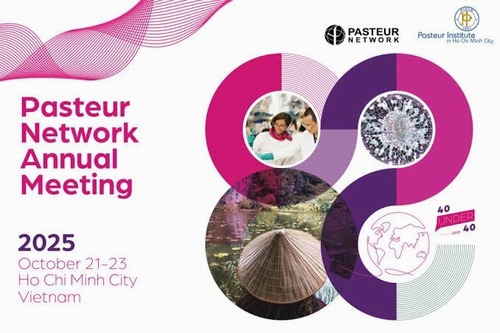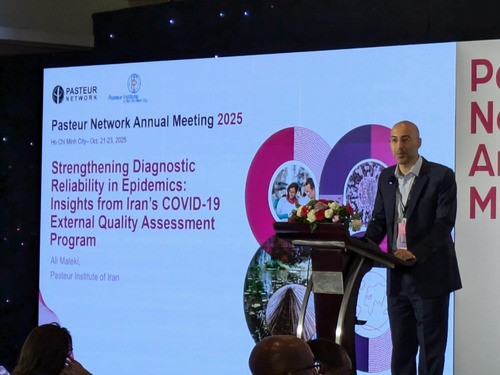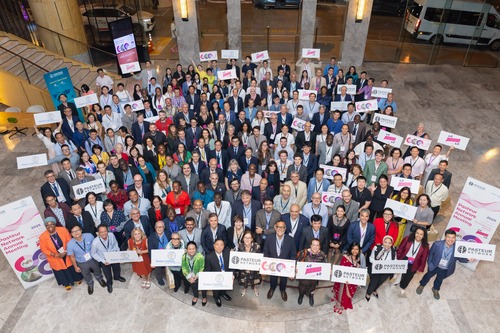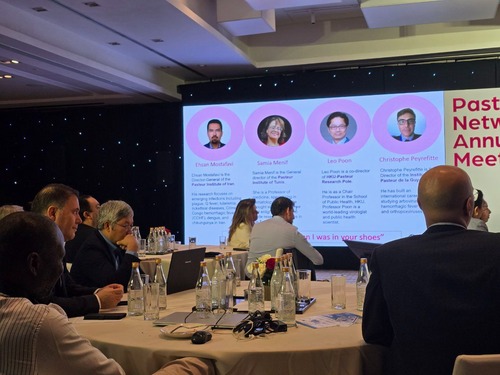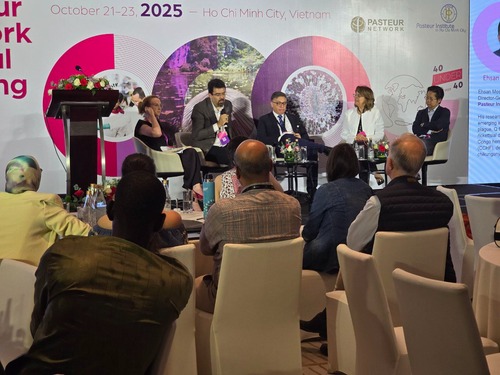Active Participation of the Pasteur Institute of Iran at the Pasteur Network Annual Meeting in Vietnam
The Pasteur Network Annual Meeting (PNAM 2025) was held from October 20 to 22, 2025, in Ho Chi Minh City, Vietnam. Representatives and heads of various Pasteur Institutes gathered for this event. The delegation from the Pasteur Institute of Iran consisted of Dr. Ehsan Mostafavi, the Director General; Dr. Morteza Karimipoor, the Deputy for Research, Technology, and Education; Dr. Kayhan Azadmanesh, the Advisor for Strategic Planning and Monitoring; Dr. Alireza Kavianpour, the Production Manager; and Dr. Ali Maleki, a Faculty Member and the institut’es representative for "40 Under 40" initiative. Over the three-day meeting, the Iranian delegation participated in various scientific working groups and discussed topics such as enhancing the role of the institutes within the Pasteur Network, strengthening diagnostic, research, and production capacities, and developing regional collaborations. The working group sessions combined technical and managerial discussions, providing a platform for expanding scientific and operational cooperation among network members.
The Director General of the Pasteur Institute of Iran participated in meetings of the Network's Heads and the meeting of Heads of Institutes from the Asia-Pacific region. In a panel featuring the heads of the Pasteur Institutes of Hong Kong, Tunisia, and Guyana, Dr. Ehsan Mostafavi elaborated on the activities of the Pasteur Institute of Iran, his professional journey, and career experiences, and answered questions from the audience. A central focus of PNAM 2025 was the "40 Under 40" initiative, which highlighted 40 emerging researchers under the age of 40 from across the Pasteur Network. These young scientists led six plenary sessions, showcasing their contributions to infectious disease research, public health innovation, and global collaboration. Dr. Ali Maleki who represented the Pasteur Institute of Iran in this section, gave a presentation on the role of the Pasteur Institute of Iran in establishing the COVID-19 diagnostic network. The topic of his presentation was the launch and coordination of the diagnostic network, mechanisms for periodic evaluation of partner laboratories, quality assurance of diagnostic results, and lessons learned during the process of strengthening the diagnostic chain and quality control.
During this meeting, the importance of the Pasteur Network and its members was repeatedly emphasized. This network plays a key role in strengthening public health and advancing research on infectious diseases by providing international collaboration infrastructure, capacity building in diagnostic, research, and production fields, rapid response to health threats, and sharing knowledge and resources. Network members, including the Pasteur Institute of Iran, contribute to strengthening the resilience of health systems at regional and global levels through participation in training programs, specialized assessments, and joint projects. At the conclusion of the meeting, participants emphasized the continuation of dialogues and the follow-up on proposals presented in the working groups. Ways to expand technical and educational cooperation for enhancing diagnostic and research capacities were also considered.
This year’s PNAM provided an opportunity for leaders and experts from across the Pasteur Network to gather and exchange views, aiming to find effective solutions for addressing global health challenges. The Pasteur Network is a coalition of over 30 core member institutes in 25 countries across 5 continents, playing a vital role in confronting global health threats through the advancement of science, innovation, and public health. Key topics of this meeting included climate change-related diseases, viral diseases and respiratory infections, innovation in diagnosing emerging and re-emerging diseases, and collaboration in vaccine production.

